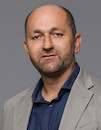Control Techniques in Mechatronics
Data is displayed for academic year: 2023./2024.
Exercises
Laboratory exercises
Course Description
PID controller structures, Practical aspects of PID controller design; Filtering; Anti-windup
Tuning of PID controller parameters;
Linear algebraic methods (model matching, pole placement, Diophantine equation)
Comparison of single loop and multi loop (cascade) control systems,Magnitude optimum (MO),Symetric optimum (SO)
Fundamentals of microcontrollers and DSPs used for control of electrical drives
Software implemetations of digital controllers,
Hardware realization of digital controllers,Controller implementation in FPGA
Study Programmes
University graduate
[FER3-HR] Audio Technologies and Electroacoustics - profile
Elective Courses
(1. semester)
(3. semester)
[FER3-HR] Communication and Space Technologies - profile
Elective Courses
(1. semester)
(3. semester)
[FER3-HR] Computational Modelling in Engineering - profile
Elective Courses
(1. semester)
(3. semester)
[FER3-HR] Computer Engineering - profile
Elective Courses
(1. semester)
(3. semester)
[FER3-HR] Computer Science - profile
Elective Courses
(1. semester)
(3. semester)
[FER3-HR] Control Systems and Robotics - profile
Elective Courses
(1. semester)
(3. semester)
[FER3-HR] Data Science - profile
Elective Courses
(1. semester)
(3. semester)
[FER3-HR] Electrical Power Engineering - profile
Elective Courses
(1. semester)
(3. semester)
[FER3-HR] Electric Machines, Drives and Automation - profile
(1. semester)
[FER3-HR] Electronic and Computer Engineering - profile
Elective Courses
(1. semester)
(3. semester)
[FER3-HR] Electronics - profile
Elective Courses
(3. semester)
[FER3-HR] Information and Communication Engineering - profile
Elective Courses
(1. semester)
(3. semester)
[FER3-HR] Network Science - profile
Elective Courses
(1. semester)
(3. semester)
[FER3-HR] Software Engineering and Information Systems - profile
Elective Courses
(1. semester)
(3. semester)
Learning Outcomes
- Apply a multi loop (cascade) control on mechatronical system
- Synthesise controllers using practical optimums (techincal optimum, symmetrical optimum, double-ratio optimum)
- Develop a contoller suitable for implementation in a digital signal processor
- Design and implementation of a controller on a hardware (FPGA)
- Choose parameters of PID controller
Forms of Teaching
Lectures
Tee lectures will organized on weekly basis with weekly load of 3 hours
ExercisesWill be organized on weekly basis with weekly load of 1 hour
LaboratoryThis component will be organized as 8 three-hours laboratory exercises
Grading Method
| Continuous Assessment | Exam | |||||
|---|---|---|---|---|---|---|
| Type | Threshold | Percent of Grade | Threshold | Percent of Grade | ||
| Laboratory Exercises | 40 % | 20 % | 40 % | 20 % | ||
| Mid Term Exam: Written | 40 % | 30 % | 0 % | |||
| Final Exam: Written | 40 % | 30 % | ||||
| Final Exam: Oral | 20 % | |||||
| Exam: Written | 40 % | 40 % | ||||
| Exam: Oral | 40 % | |||||
Week by Week Schedule
- PID controller structures, Practical aspects of PID controller design; Filtering; Anti-windup
- Tuning of PID controller parameters; Ziegler-Nichols methods, PID controller parametrization using pole assignment
- Linear algebraic methods (model matching, pole placement, Diophantine equation)
- Loop shaping; Lead and lag compensator
- Modeling of digital control system elements, Sampling, Antialiasing
- Comparison of single loop and multi loop (cascade) control systems, Magnitude optimum (MO), Symetric optimum (SO)
- Digital implementation of symetric optimum
- Midterm exam
- Fundamentals of microcontrollers and DSPs used for control of electrical drives
- Signal processing required for digital control of electrical drives, Per unit system; Numerical formats, Signal conditioning for control of electrical drives
- Classification of digital control systems, Structure of digital control systems, DSP based control of AC/DC and DC/DC converters, Inline and output filters
- DSP-based implementation of IM control, DSP-based implementation of PMSM control, DSP-based implementation of BLDC control
- Software implemetations of digital controllers, Effect of A/D conversion, Effect of controller arithmetic: fixed point vs floating point, Effect of controller realization forms, Controller implementation in delta-domain
- Hardware realization of digital controllers, Controller implementation in FPGA
- Final exam
Literature
For students
General
ID 223086
Winter semester
5 ECTS
L1 English Level
L1 e-Learning
45 Lectures
0 Seminar
15 Exercises
24 Laboratory exercises
0 Project laboratory
0 Physical education excercises
Grading System
87.5 Excellent
75 Very Good
62.5 Good
50 Sufficient


 Pristupačnost
Pristupačnost


